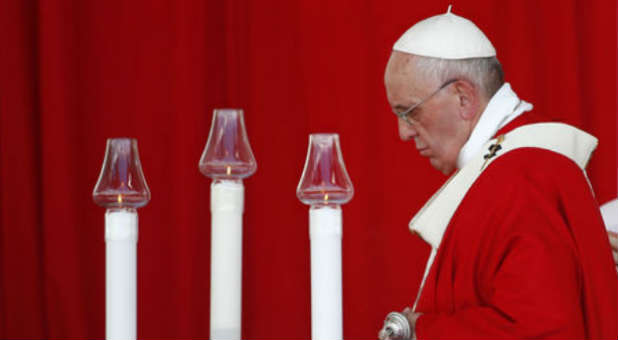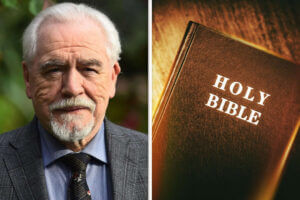Is the pope infallible? Is he divinely protected from error in his official duties? Pope Francis’ visit to the United States is serving as a reminder of the profound doctrinal differences that separate Catholics from Protestants and, indeed, from the rest of Christendom.
No issue has been more historically divisive than the claims of the Roman bishop (the pope) of having authority over all Christendom. These historic claims of papal preeminence are based on the idea of Peter’s primacy among the apostles, and the popes being Peter’s successors and inheriting Peter’s preeminence and authority.
These papal claims of power culminated with the dogma of papal infallibility being declared in 1870 by the Vatican I Council. According to this council, the pope is preserved from the possibility of error, “when, in the exercise of his office as shepherd and teacher of all Christians, in virtue of his supreme apostolic authority, he defines a doctrine concerning faith or morals to be held by the whole Church.”
In challenging the dogma of papal infallibility it is important that we separate the person from the office. Pope Francis seems like a good, decent man and I have been impressed with how he has reached out to Christians outside the Catholic Church, including those of my own Pentecostal/charismatic persuasion. I have read his book, The Church of Mercy, and was impressed by the tone of compassion and humility that I sensed throughout.
Francis, however, occupies an office that has a long and problematic history, too often characterized by scandal, deceit, and love for power. This is why Hans Kung, the most widely read Catholic theologian in the world today, states that the long road leading to Vatican I “was built with an unflagging Roman concern for power, which did not hesitate even over the use of forgeries” (Kung, Christianity: Essence, History, and Future, 319).
Not only Protestants and Eastern Orthodox, but many Catholics today are questioning the Catholic doctrine of papal infallibility. I like Pope Francis as a person, but I cannot accept the doctrine of papal infallibility for the following reasons.
It Has No Basis in Scripture
Jesus warned the Twelve, including Peter, against adopting honorific titles that would set them apart from one another. Referring to titles used by the Jewish leaders of that day, He admonished:
“But do not be called ‘Rabbi,’ for you have one Teacher, the Christ, and you are all brothers. And call no man on earth your father, for you have one Father, who is in heaven. Nor be called teachers, for you have one Teacher, the Christ. He who is greatest among you shall be your servant” (Matt. 23:8-11).
This is why, in the New Testament, we find no sign of a hierarchy in the leadership of the church. Words that carried connotations of authority such as archon (ruler), timē (rank), and despot (master) are used of Jewish and secular rulers but are glaringly missing in regards to Christian leaders.
A Servant Model of Leadership
Instead, diakonos, a word meaning “servant,” with no connotations of power, status or rank, is used of leaders in the church. Diakonos is the word Jesus used when He rebuked the Twelve when they were arguing over who would be the greatest. He said to them, “Whoever would be great among you must be your servant” (Mark 10:43).
Paul often used the word diakonos to describe himself and his coworkers. To the Corinthian believers who were putting apostles and preachers on pedestals and building cliques around them, Paul asked who Paul and Apollos were besides servants (or diakonoi) through whom they believed. Unfortunately, in many cases, diakonoi has been translated as “minister,” thus losing the force of its original meaning of a “servant” with no status or privilege.
Contrary to the diakonos model laid out by Jesus, those advocating papal infallibility emphasize the primacy of Peter among the apostles and his preeminence and authority over the church. They also insist that this authority of Peter has been passed along to the popes through a mechanical, religious rite called apostolic succession. These beliefs led to the bishop of Rome adopting titles such as “Successor of the Prince of the Apostles” and “Supreme Pontiff of the Universal Church,” which are so out of character with Jesus and the New Testament.
The Church Is Built on Jesus Christ
Matthew 16:18-19 is used by papal advocates to claim that Jesus said He would build His church on Peter and that He gave Peter the keys of authority over the church. It is clear, however, from even a cursory examination of this passage that the church is not built on Peter, but on Peter’s revelation of who Jesus is, or in other words, on Jesus Himself. Also, the word “you” in this passage concerning the keys of the kingdom is plural, indicating that the keys are given to the church, not solely to Peter.
That the church is built on Christ Himself is affirmed by Paul in 1 Corinthians 1:11. Commenting on his founding of the church in Corinth, Paul declared that no other foundation could be laid other than that which was already laid, which is Jesus Christ. Interestingly, this was also confirmed by Pope Benedict XVI, who as the young Joseph Ratzinger, wrote in his doctoral dissertation, “If the church is founded on Peter, it is not founded on his person, but on his faith … the foundation of the church is Christ.”
No Primacy of Peter in the New Testament
Other passages of Scripture make it clear that Peter held no special primacy among the apostles. Consider, for example, that when Peter went to Antioch and waffled concerning the equal acceptance of the Gentiles in Christ, Paul publicly rebuked him in front of the church because, as Paul said, he was to be blamed (Gal. 2:11).
That there was no primacy of Peter is also borne out in Peter’s conversation with the Lord after His resurrection as recorded in John 21:15-25. In the midst of Jesus instructing Peter to feed His sheep, Peter turned around to John and said to Jesus, “What about this man?” With a stern rebuke, Jesus replied, “If it is My will that he remain until I come, what is that to you? Follow Me!” (John 21:22).
In other words, there were things about the church that did not concern Peter—that were none of his business. Jesus had a relationship with John that was of no concern to Peter. There were things that would occur in the church that did not have to pass through Peter. They were of no concern to him. Peter must give himself to his own task and not intrude into the affairs of others. When he would involve himself with matters that were of no concern to him, he could expect to hear the voice of the Master saying, “What is that to you? You follow Me.”
The doctrine of a primacy of Peter that is passed down to the popes by an apostolic succession is a development of later history that papal advocates seek to impose back on Scripture. It has no basis in either Scripture or early Christianity. Professor Burnett Streeter was correct when he wrote:
“Whatever else is disputable, there is, I submit, one result from which there is no escape. In the primitive church there was no single system of church order laid down by the apostles. During the first 100 years of Christianity, the church was an organism alive and growing—changing its organization to meet changing needs. Uniformity was a later development” (Eddie Hyatt, Pursuing Power, 43).
See an error in this article?
To contact us or to submit an article






















